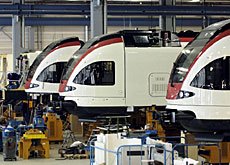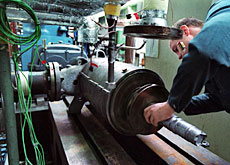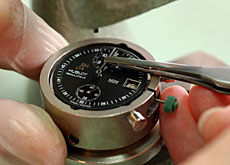How the German elections affect Switzerland

Germany and Switzerland have close economic ties – which is why Swiss industry is keeping a close eye on Sunday's German elections.
But Swiss experts are greeting the possible power swap on September 18 with guarded optimism.
“From a liberal point of view these elections are hardly the great white hope,” Silvio Borner, a professor of economics at Basel University, told swissinfo.
“So far Merkel and Schröder have shied away from discussing real reforms.”
Borner says a handover of power would be “economically advantageous, especially if the FDP [Free Democratic Party] came in as a partner”.
But he doesn’t put a lot of faith in the FDP either. “It’s not as consistent as it once was. When it comes to civil liberties, the Greens out-liberal the Liberals.”
Leftwing pressure
Borner says Merkel’s Christian Democrats – like their Swiss counterparts – have “a real interventionist and protectionist attitude when their own special interests are at stake”.
But he considers a change of government to be in Germany’s interests.
“The chancellor [Schröder] is coming under increasing pressure from the Left. Even if [Schröder’s] Social Democrats manage in principle to push through some reforms, this is a spent government – they really drove themselves into a wall with their anti-American foreign policy.”
If the theory is correct that stock markets anticipate economic development, then the German economy is on the verge of an upturn. The Dax, the German share index, has been riding high ever since Schröder announced elections.
Long-term trust
However a change of government won’t solve Germany’s problems overnight, according to Ralf Bopp, director of the German-Swiss chamber of commerce.
“The problems facing Germany’s society and economy have developed over decades,” he told swissinfo, adding that the new government must win back the voters’ trust in the longer term.
Continuity is required in the reform process, he says. “In the short term, I think a change would give the economy a purely psychological boost.”
One thing on which all experts agree is that Switzerland is heavily dependent on Germany, its most important foreign trade partner.
Twenty per cent of Swiss exports head to Germany and a third of Switzerland’s imports come from its northern neighbour. The southern German state of Baden-Württemberg on its own generates the same trade volume as the United States.
Germany plays a central role for the Swiss machine, metal and pharmaceutical industries, but also for tourism. Germans account for every third Swiss hotel bed occupied by a foreigner.
Swiss responsibility
Yet a possible upturn in Germany does not automatically result in an upturn in Switzerland.
“If Swiss hoteliers want to attract more German guests, they must become more customer-friendly and more competitive,” concludes Christoph Kollreuter, head of the Basel Economics analysis centre (BAK), citing a simple example.
Kollreuter is not expecting a revival of the German economy following a change of government.
“Looking at the Christian Democrat programme doesn’t exactly fill me with optimism,” he says. “The German elections are not a factor for Swiss growth – we shouldn’t pin our hopes on them.”
Aymo Brunetti, chief economist at the State Secretariat for Economic Affairs, agrees. “We can’t hope Germany will solve our problems.”
swissinfo, Andreas Keiser
Gerhard Schröder has been Chancellor of Germany since 1998. He heads a coalition of his Social Democratic Party (SPD) and the German Green Party.
In a federal election on September 18, Germans are expected to replace Schröder with Angela Merkel, president of the Christian Democratic Union (CDU).
The announcement of the early election followed the defeat of the SPD in Germany’s most populous state North Rhine-Westphalia on May 22 and the unsuccessful motion of confidence in Schröder (which he wanted to lose to be able to call an early election) on July 1.

In compliance with the JTI standards
More: SWI swissinfo.ch certified by the Journalism Trust Initiative


You can find an overview of ongoing debates with our journalists here. Please join us!
If you want to start a conversation about a topic raised in this article or want to report factual errors, email us at english@swissinfo.ch.